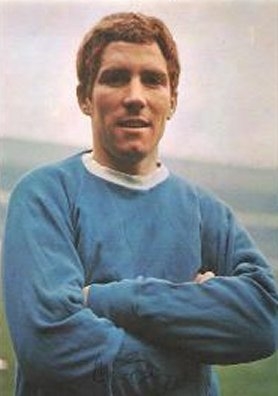 Alan Ball was born on May 12th 1945 in Farnworth, England. Named after his father, who was also a footballer and manager, Ball, England’s youngest World Cup winner, was one of the finest midfield players England produced in the 1960s, although his club career perhaps never quite developed as it should have done.
Alan Ball was born on May 12th 1945 in Farnworth, England. Named after his father, who was also a footballer and manager, Ball, England’s youngest World Cup winner, was one of the finest midfield players England produced in the 1960s, although his club career perhaps never quite developed as it should have done.
Ball was signed by Blackpool and turned professional in 1962, making his debut in a 2-1 win over Liverpool at Anfield. He made enough of an impression in his first few seasons in the game for Alf Ramsey to pick him for England. Ball earned the first of his 72 caps a few days before his 20th birthday, in the 1-1 draw with Yugoslavia.
A year later, Ball played a vital role in the system employed by Ramsey to win the World Cup and played a part in two of the goals, providing the pass for Geoff Hurst’s controversial over-the-line goal.
After his World Cup success, Ball was in demand and made a move to Everton in August 1966, for a British record fee of £110 000. It was at Everton that he won his only major domestic honour, when Everton won the 1969-70 League Championship, but he was also on the losing side in the 1968 FA Cup Final and 1971 FA Cup semi finals with them. In between times, he was an important member of England’s 1970 World Cup team. He left Everton in December 1971, when he joined Arsenal for £220 000, another British record fee.
Arsenal failed to defend their title in 1971/72 and lost the FA Cup Final that season. Ball, who had by now earned his 50th England cap, became only the second player to be sent off for his country, in a World Cup qualifier in Poland. He was suspended for the return game, which saw England fail to qualify and Alf Ramsey was sacked shortly after. Ramsey’s eventual replacement, Don Revie, made Ball captain and he had six matches with the armband, none of which were lost, including a famous 5-1 victory over Scotland at Wembley. Then, at the age of 30, Ball’s international career was finished. Not only did Revie leave him out of his squad for a match with Switzerland, he did not even bother to inform his captain of his decision. In 72 matches for his country, Alan Ball scored 8 goals.
During this period, Ball had played for Arsenal and been made captain, but the team which had won the double was broken up and with the club in decline, their manager, Bertie Mee, resigned. The new man, Terry Neill, decided to sell Alan Ball to Southampton for a fee of £60 000 in 1976. He had played 217 games for Arsenal, scoring 52 goals and pioneered white football boots!
At Southampton, Ball helped the club gain promotion to the top division and also collected a League Cup runners-up medal in 1979, before heading off to North America and stints as player-coach with Philadelphia Fury and Vancouver Whitecaps.
He returned to England to take up a player-manager role with Blackpool, but it only lasted a year. He made a return to Southampton as a player, alongside the veteran Kevin Keegan, but after 19 months he was off again, this time for a brief spell playing in Hong Kong, before returning to play for his final club in England, Bristol Rovers.
After retiring, Ball took over as manager of Portsmouth in 1984 and took them into the top division in 1987, although they were relegated again and Ball was sacked in 1989. He had spells as coach at Colchester and Stoke City, eventually taking over as manager only to be sacked in 1991. After three years as manager of Exeter City, Ball returned to Southampton in 1994.
Taking over the club when they were rooted in the relegation zone, Ball managed to lead the club to safety. By one point. The following season he built on this and took the club to tenth, but left at the end of the season to take over as manager of Manchester City, owned by his old friend Francis Lee. His time at City was a disaster. The club was relegated after his first year and he left after just three matches of the following season.
He returned to Portsmouth in 1998 and managed to save the club from relegation, dooming two former teams, Stoke and Manchester City, to relegation with a last day victory over Bradford City. With the club in financial crisis, Ball’s contract was terminated in 1999 and he retired from management at the age of 54.
In retirement, he became close to the world of horse racing and also appeared from time to time as a pundit on tv and radio. In 2000, he was awarded an MBE for his services to football and was voted into the English Football Hall of Fame in 2003.
Alan Ball died of a heart attack on April 24th 2007, at the age of 61.
By Tim
One Comment
AS a Blackpool lad I first saw this wonderful little player in 62. His energy and enthusiasm was infectious. He will be sadly missed as one of Englands greats